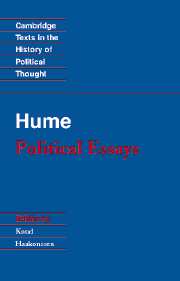Book contents
- Frontmatter
- Contents
- Acknowledgements
- Introduction
- Chronology
- Bibliographical notes
- A note on the text and the edition
- Biographical notes
- Bibliography
- Political Essays
- 1 Of the liberty of the press
- 2 That politics may be reduced to a science
- 3 Of the first principles of government
- 4 Of the origin of government
- 5 Of the independency of Parliament
- 6 Whether the British government inclines more to absolute monarchy, or to a republic
- 7 Of parties in general
- 8 Of the parties of Great Britain
- 9 Of superstition and enthusiasm
- 10 Of civil liberty
- 11 Of the rise and progress of the arts and sciences
- 12 Of national characters
- 13 Of commerce
- 14 Of refinement in the arts
- 15 Of money
- 16 Of interest
- 17 Of the balance of trade
- 18 Of the jealousy of trade
- 19 Of the balance of power
- 20 Of taxes
- 21 Of public credit
- 22 Of some remarkable customs
- 23 Of the original contract
- 24 Of passive obedience
- 25 Of the coalition of parties
- 26 Of the Protestant succession
- 27 Idea of a perfect commonwealth
- Appendix: Excerpts from Hume's History of England
- Notes
- Index
- Title in the Series
7 - Of parties in general
Published online by Cambridge University Press: 05 June 2012
- Frontmatter
- Contents
- Acknowledgements
- Introduction
- Chronology
- Bibliographical notes
- A note on the text and the edition
- Biographical notes
- Bibliography
- Political Essays
- 1 Of the liberty of the press
- 2 That politics may be reduced to a science
- 3 Of the first principles of government
- 4 Of the origin of government
- 5 Of the independency of Parliament
- 6 Whether the British government inclines more to absolute monarchy, or to a republic
- 7 Of parties in general
- 8 Of the parties of Great Britain
- 9 Of superstition and enthusiasm
- 10 Of civil liberty
- 11 Of the rise and progress of the arts and sciences
- 12 Of national characters
- 13 Of commerce
- 14 Of refinement in the arts
- 15 Of money
- 16 Of interest
- 17 Of the balance of trade
- 18 Of the jealousy of trade
- 19 Of the balance of power
- 20 Of taxes
- 21 Of public credit
- 22 Of some remarkable customs
- 23 Of the original contract
- 24 Of passive obedience
- 25 Of the coalition of parties
- 26 Of the Protestant succession
- 27 Idea of a perfect commonwealth
- Appendix: Excerpts from Hume's History of England
- Notes
- Index
- Title in the Series
Summary
Of all men, that distinguish themselves by memorable atchievements, the first place of honour seems due to legislators and founders of states, who transmit a system of laws and institutions to secure the peace, happiness, and liberty of future generations. The influence of useful inventions in the arts and sciences may, perhaps, extend farther than that of wise laws, whose effects are limited both in time and place; but the benefit arising from the former, is not so sensible as that which results from the latter. Speculative sciences do, indeed, improve the mind; but this advantage reaches only to a few persons, who have leisure to apply themselves to them. And as to practical arts, which encrease the commodities and enjoyments of life, it is well known, that men's happiness consists not so much in an abundance of these, as in the peace and security with which they possess them; and those blessings can only be derived from good government. Not to mention, that general virtue and good morals in a state, which are so requisite to happiness, can never arise from the most refined precepts of philosophy, or even the severest injunctions of religion; but must proceed entirely from the virtuous education of youth, the effect of wise laws and institutions. I must, therefore, presume to differ from Lord Bacon in this particular, and must regard antiquity as somewhat unjust in its distribution of honours, when it made gods of all the inventors of useful arts, such as Cares, Bacchus, Aesculapius; and dignified legislators, such as Romulus and Theseus, only with the appellation of demigods and heroes.
- Type
- Chapter
- Information
- Hume: Political Essays , pp. 33 - 39Publisher: Cambridge University PressPrint publication year: 1994
- 4
- Cited by



